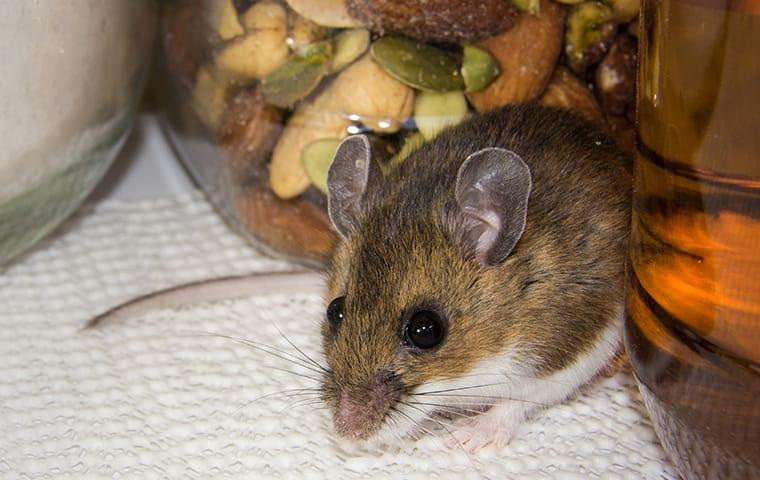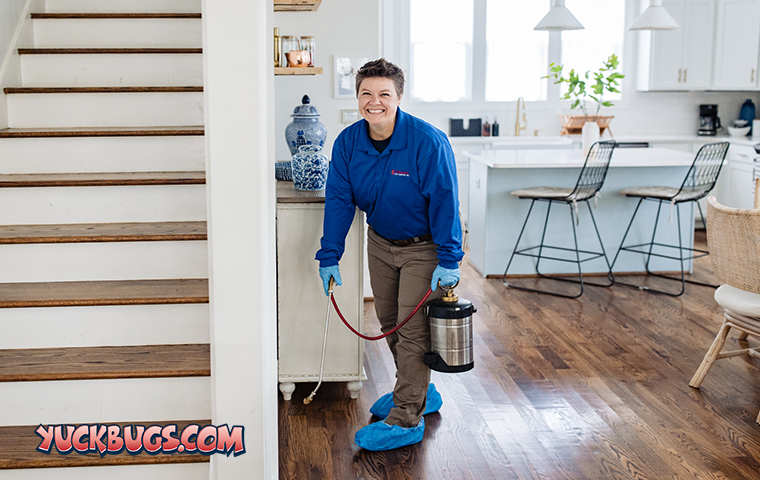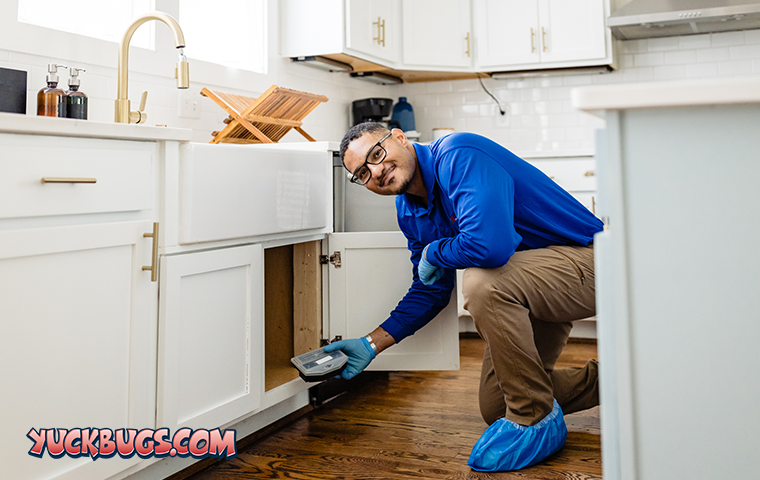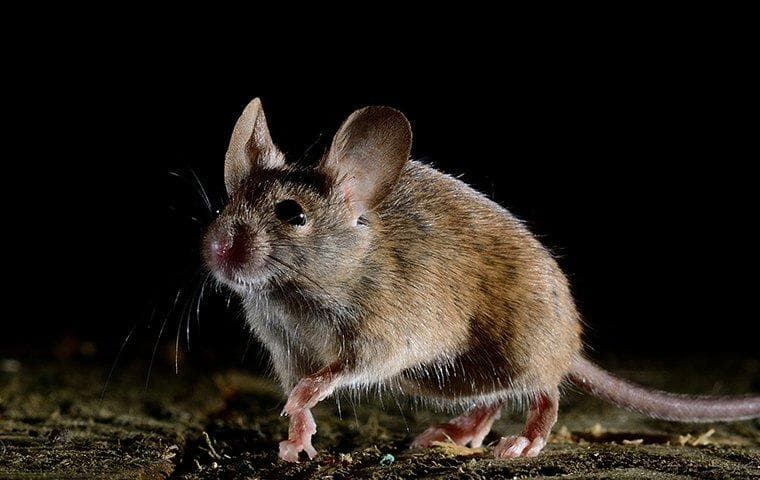A fun activity when friends and family come over to visit is to play a guessing game where someone tries to get you to say a phrase, word, or topic by giving a series of hints. Winning the game usually requires a series of suggestions before one successfully guesses the answer. Hints are a series of tips pointing you to the explanation and often build on one another.
Like many pests, mice are nocturnal; they are active at night while you sleep. Since they are scurrying through your house while you sleep, you may not see them, but they do leave hints. The key is to know what suggests mice are in the home and where to search for them.
To learn what those hints are and what you can do about them, continue to read this article. In the meantime, take action and secure the experienced Brentwood pest control from All-American Pest Control. We have removed mice from local homes since 1961; we are your local family-owned and operated pest control company with a longstanding reputation of providing quality pest and rodent control for over 50 years.

Does One Mouse Hint Towards An Infestation?
The adage, "Red sky at night sailors delight; red sky in the morning sailor takes warning," is about the hints we see in the sky regarding incoming weather. This planet is hardwired to suggest impending danger; for example, big cumulus clouds rolling in with westerly wind hints at an impending thunderstorm. In the same way, the sight of a mouse is a hint that you may have an infestation.
Mice have a hierarchy wherein the male dominates several females and their young. In a nest with several females, the female mice create a loose ranking amongst themselves within their territory.
Rodents are nocturnal and forage at night, but if the nest grows too large, the lower-ranking mice must wait until the upper-level mice have finished, and as a result, some mice are still active during the day, which is when the homeowner may see them. Thus, seeing a mouse could indicate a large infestation of mice in your Brentwood home.
One mouse does not prove an infestation, but it should alert you to investigate by looking for these hints:
- Droppings: Mice eat about 10% to 15% of their body weight daily, which results in an output of 18,000 mice droppings annually per mouse. These rodents leave rod-shaped pellets with pointed ends along walls, under appliances, in corners, and around objects in the garage, attic, utility closets, and basement.
- Gnaw marks: One characteristic of rodents is constantly growing incisor teeth, and unless they trim their teeth regularly, they grow too large and inhibit the rodent's eating ability. Therefore, mice must constantly gnaw to shorten their teeth by chewing on wood, plastic, aluminum siding, food packaging, books, and anything else except glass and thick metal.
- Grease stains: Mice have oily fur that attracts the dirt and grime from the sewers, drains, animal feces, and rotten garbage where they forage. Mice have poor eyesight and rely on their whiskers to guide them as they travel close to walls and objects. They leave smudge marks as they bump against walls, corners, and things while traveling.
- Urine stains: When mice find a food source, they urinate along the path. They release urine not only out of necessity but because their urine contains a pheromone that alerts other mice to the food location. As other mice follow the scent, they create a trail to the food.
- Odor: The urine of mice has a strong odor, and if the mouse infestation is significant, the smell becomes noticeable in that area of the house.
- Uneaten food: Rats stay at the food source and eat until they have consumed the food, but mice nibble and leave behind partially eaten food. Mice are curious creatures who attempt to eat anything; if they chew on something they don't like, they will discard it.
- Sounds: In the evening or early morning hours, if you are still for several minutes, you may hear mice scratching inside the walls as they create nests, running across the attic, over the roof, or underneath the floor in the crawlspace.
- Tracks: You will see footprints of four and five-toes in dusty areas of the house where they travel. If you suspect mice are in your Brentwood house, sprinkle talcum powder in the areas where you see hints and wait a couple of days to see if tracks appear.
- Nest: The sight of ripped insulation or shredded papers in the attic, utility closets, garage, and basement suggest mice are in your Brentwood home.
You will find these hints along pathways in the garage, basement, attic, kitchen, and utility closets mice create from their nest to food sources. Secure mouse control from All-American Pest Control if you spot these signs.
The Health Problems That Mice Can Cause
Although some people make mice pets because they think they are cute and cuddly, you do not want mice to be in your Brentwood home because of the diseases mice spread. Mice search for food in filthy, unsanitary areas like garbage cans, sewers, compost piles, and sewers where bacteria and viruses lay on the surface. As the mice forage in these areas, their greasy fur attracts disease-causing pathogens. Furthermore, as they consume food in these areas, they ingest those same infectious organisms into their system.
Later, when the mice enter a house, they shed the bacteria and viruses as they travel and rub against surfaces. Mice spread disease by contaminating surfaces with their urine and feces. They also pollute food products when they chew on the packaging as they attempt to get to the food contained inside.
In the middle Tennessee area, deer and house mice are the main species entering Brentwood homes. Deer mice spread hantavirus, leptospirosis, tularemia, salmonellosis, and adult respiratory distress syndrome (ARDS). These diseases can cause fever, chills, gastrointestinal symptoms, and difficulty breathing. House mice spread the same diseases as deer mice except for hantavirus and adult respiratory distress syndrome. However, they carry an additional illness, lymphocytic choriomeningitis (LCM).
You can contract these diseases by touching a dead mouse with unprotected hands, eating food from a contaminated surface, or when the urine and feces dry and the pathogens become airborne in your house.
In addition to the pathogens mice carry on their fur, they also transport fleas, ticks, mites, and lice. Fleas and ticks can spread disease when they bite a host; symptoms can be severe and deadly without immediate medical care.
How And Why Mice Find Their Way Into Your Home
There are three reasons for a mouse infestation in the house: food, water, and shelter; when temperatures decline in the fall and winter, mice search for these three items necessary for survival. As they scurry around a house, they detect warmer air emanating from the structure, and they may also smell food. With the possibility of shelter and food looming, the mice will search for a way to enter the house. When mice enter a home and find food, water, and shelter, they leave a pheromone trail in their urine to alert other mice of the route, and thus an infestation begins!
Mice can squeeze through openings as small as 1/4 inch and, due to their curious nature, they will investigate any hole, crack, or gap looking for an entry point. At the foundation level, these openings may be cracks between mortar and frames or crawlspace vents, incoming pipes and wires, and missing bricks or siding. Mice enter beneath exterior doors or through open garage doors.
Because these rodents are excellent at climbing and jumping, they are not limited to ground-level openings; mice can access entry points along the roof, chimney, and around attic vents using tree and shrub branches that touch the house as a bridge.
Professional House Mouse Control Made Simple For Brentwood Homes
Seeing a mouse in the house may hint at a much larger infestation in your Brentwood home. The best action is to protect your family from disease exposure and safeguard your house from damage by obtaining mouse control in Brentwood from All-American Pest Control. We will dispatch our highly-trained and certified service team members to your location to inspect the home. We will determine nesting locations, entry points, and attractions. We will create a custom strategy to eradicate rodents from your Brentwood home using eco-friendly and safe techniques.
Once we have eradicated the mice from your house, we recommend the following:
- Keep all garbage containers inside and outside the house closed.
- Remove leaf and wood piles, old tires, and other debris from the property.
- Provide proper drainage for ditches and low-lying areas.
- Seal gaps in the foundation around incoming wires and pipes and along the roofline.
- Cover attic and crawlspace vents using 1/4 inch wire mesh.
- Keep the lawn free of animal feces, fallen fruit, and bird seed feeders (or elevate the feeders on a single pole away from trees or bushes).
- Prune tree branches and bushes away from the house.
Maintaining a clean and dry property will keep mice out of the house.
When we remove the rodents, our service professionals will work with you to identify attractions and make additional prevention recommendations to ensure mice do not return to your house. Contact us today and get a quote or request a free evaluation.
We're Ready To Help
Call Our Office or Complete the Form To Get Your Customized Quote
 1277 Reviews
1277 Reviews








